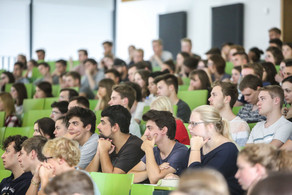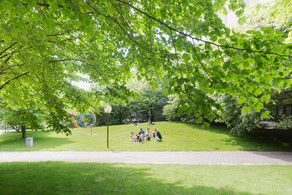Prof. Dr. Norbert Zmyj
Focus of work
- Influence of stress on action perception
- Development of ego-consciousness, imitation and Theory of Mind
- Development of attitudes towards groups
- Factors influencing the development of false memories in children
Office hours
During the lecture period in SS 2023: as required and by prior agreement via ZOOM
More information
since 2015 Professor (W3) for Developmental Psychology TU Dortmund University
2013 Positive evaluation of the junior professorship
2010 - 2015 Junior Professor (W1) for Applied Social and Developmental Psychology Ruhr-University Bochum
2009 - 2010 Post-doc Max Planck Institute for Human Cognitive and Brain Sciences, Leipzig
2009 Doctoral thesis: "Selective imitation in one-year-olds: How a model's characteristics influence imitation".
2005 - 2008 PhD student Max Planck Institute for Human Cognitive and Brain Sciences, Leipzig (fellow in the DFG Research Training Group "Function of Attention in Cognitive Processes", DFG 1182)
2005 Diploma in Psychology Thesis Topic: "Gender Identity, Time Comprehension and Theory of Mind. Cognitive Structural Change between the Fourth and Sixth Year of Life".
2002 - 2005 Student Assistant Max Planck Institute of Psychology, Munich Junior Research Group "Development of Cognition and Action" (Head: Gisa Aschersleben)
2000 - 2005 Studies of Psychology Ludwig-Maximilians University, Munich
Articles in journals with reviewer system
In print
2023
- Witt, S., Seehagen, S., & Zmyj, N. (2023). Stress affects the prediction of others’ behavior. PLOS ONE, 18, e0283782. doi: 10.1371/journal.pone.0283782
- Tisborn, K., Kumsta, R., Zmyj, N. & Seehagen, S. (2023). A matter of habit? Stressful life events and cognitive flexibility in 15-month-old infants. Infant Behavior and Development, 71, 101810.
doi: 10.1016/j.infbeh.2023.101810 - Klein-Radukic, S. & Zmyj, N. (2023). The predictive value of the cognitive scale of the Bayley Scales of Infant and Toddler Development-III. Cognitive Development, 65, 101291.
doi: 10.1016/j.cogdev.2022.101291
2022
- Margoni, F., Block, K., Hamlin, K., Zmyj, N., & Schmader, T. (2022). Meta-analytic evidence against sex differences in infants' and toddlers' preference for prosocial agents. Developmental Psychology, September 15. doi: 10.1037/dev0001421
- Witt, S., Seehagen, S. & Zmyj, N. (2022). The influence of group membership on false-belief attribution in preschool children. Journal of Experimental Child Psychology, 222, no. 105467. doi: 10.1016/j.jecp.2022.105467
- Zmyj, N., Rausch, A., Schröder, L. & Seehagen, S. (2022). The development of children's egalitarianism in the context of group membership and resource valence. Journal of Developmental and Educational Psychology, 54, 93-104. doi: 10.1026/0049-8637/a000255
- Sieber, F. & Zmyj, N. (2022). Stability and structure of infant and toddler temperament in two longitudinal studies in Germany. Infant Behavior and Development, 67, no. 101714. doi: 10.1016/j.infbeh.2022.101714
- Buttelmann, D., Kühn, K. & Zmyj, N. (2022). The relations among Theory of Mind, inhibitory control, and aggressive behavior in 4-year-old children - A multi-measure multi-informant approach. Journal of Cognition and Development, 23, 111-134. doi: 10.1080/15248372.2021.1987240
2021
- Seehagen, S., Herbert, J. & Zmyj, N. (2021). Prior sleep timing and visual recognition of emotional faces in 6-month-old infants. Infant Behavior and Development, 65, no. 101655. doi: 10.1016/j.infbeh.2021.101655.
2020
- Buttelmann, D. & Zmyj, N. (2020). Fourteen-month-olds' imitation is more strongly influenced by a model's competence than by a model's certainty. Infant Behavior and Development, 60, No. 101458. doi: 10.1016/j.infbeh.2020.101458
- Klein-Radukic, S. & Zmyj, N. (2020). No evidence for infants' contingency detection as a precursor of toddlers' self-recognition. Infant Behavior and Development, 60, no. 101459. doi: 10.1016/j.infbeh.2020.101459.
- Vaporova, E. & Zmyj, N. (2020). Social evaluation and imitation of prosocial and antisocial agents in infants, children, and adults. PLoS one, 15 (9), No. e0235595. doi: 10.1371/journal.pone.0235595.
- Zmyj, N. & Seehagen, S. (2020). A model's competence influences false-belief attribution in preschoolers. European Journal of Developmental Psychology, 17, 123-137. doi: 10.1080/17405629.2018.1545641.
- Zmyj, N. & Huber-Bach, L. (2020). German adolescents' homonegativity and the relationship to their religious denomination and gender role orientation. Journal of LGBT Youth, 17, 241-259. doi: 10.1080/19361653.2019.1641174
2019
- Müller, D., Teismann, T., Hirschfeld, G., Zmyj, N., Fuths, S., Vocks, S., Schneider, S., & Seehagen, S. (2019). The course of maternal repetitive negative thinking at the transition to motherhood and early mother-infant interaction: Is there a link? Development and Psychopathology, 31, 1411-1421. doi: 10.1017/S0954579418000883.
- Zmyj, N. & Wehlig, R. (2019). Reducing homonegativity among German adolescents: Results of a six-week follow-up study. Journal of LGBT Youth, 16, 435-450. doi: 10.1080/19361653.2019.1590286.
- Seehagen, S., Zmyj, N., & Herbert, J. (2019). Remembering in the context of internal states: The role of sleep for infant memory. Child Development Perspectives, 13, 110-115. doi: 10.1111/cdep.12321.
2018
- Seehagen, S., Dreier, L., & Zmyj, N. (2018). Overrated adults: 4-year-olds' false belief understanding is influenced by the believer's age. Journal of Experimental Child Psychology, 167, 328-335. doi:10.1016/j.jecp.2017.11.007.
- Witt, S., Lücke, T., Neumann, N., Weitkämper, A., & Zmyj, N. (2018). Delayed Theory of Mind development in children born preterm: A longitudinal study. Early Human Development, 127, 85-89. doi: 10.1016/j.earlhumdev.2018.10.005.
- Zmyj, N. (2018). The relationship of delay of gratification and time comprehension in 4-year-old children. International Journal of Behavioral Development, 42, 434-438. doi: 10.1177/0165025417727870.
2017
- Beisert, M., Zmyj, N., & Daum, M. M. (2017). Turning the tide: A plea for cognitively lean interpretations of infant behavior (Comment on Keven and Akins). Behavioral and Brain Sciences, 40, e381. doi:10.1017/S0140525X16001849
- Hüning, B. M., Assing, B., Weishaupt, E., Dransfeld, F., Felderhoff-Müser, U., & Zmyj, N. (2017). Delay of gratification and time comprehension is impaired in very preterm children at the age of 4 years. Early Human Development, 115, 77-81. doi:10.1016/j.earlhumdev.2017.09.018.
- Seehagen, S., Schneider, S., Miebach, K., Frigge, K. & Zmyj, N. (2017). Should I or shouldn't I?" Imitation of undesired versus allowed actions from peer and adult models by 18- and 24-month-old toddlers. Infant Behavior and Development, 49, 1-18. doi:10.1016/j.infbeh.2017.06.001
- Knoll-Pientka, N., Schröder, L., Zmyj, N. & Hebebrand, J. (2017). Genetic influence on variance in prosocial behavior. childhood and development, 26, 184-195. doi:10.1026/0942-5403/a000230.
- Zmyj, N., Schölmerich, A., & Daum, M. M. (2017). The relationship between attention and deferred imitation in 12-month-old infants. Infant Behavior and Development, 48, 175-183. doi:10.1016/j.infbeh.2017.02.001.
- Zmyj, N.*, Witt, S.*, Weitkämper, A., Neumann, H., & Lücke, T. (2017). Social cognition in children born preterm: A perspective on future research directions. Frontiers in Psychology, 8, 455. doi:10.3389/fpsyg.2017.00455 *shared first authorship.
- Zmyj, N. & Marcinkowski, N. (2017). The relationship between infants' interest in feedback of self-performed actions with different latency and their parents' temporally contingent behavior. Cognitive Development, 41, 85-93. doi:10.1016/j.cogdev.2017.01.002.
- Zmyj, N., Schneider, S. & Seehagen, S. (2017). 15-month-old infants' cortisol levels decrease after a 30-min warm-up procedure. Psychoneuroendocrinology, 76, 11-13. doi:10.1016/j.psyneuen.2016.11.010.
2016
- Krieger, A.A.R., Möller, C., Zmyj, N., & Aschersleben, G. (2016). Tom is not more likely to imitate Lisa than Ying. The influence of a model's race indicated by physical appearance on children's imitation. Frontiers in Psychology, 7, 972. doi:10.3389/fpsyg.2016.00972.
- Henning, A. & Zmyj, N. (2016). Infant do, infant see: The role of feedback to infant behavior for the understanding of self and others. Infant and Child Development, 25, 233-239. doi:10.1002/icd.1987.
- Schröder, L., Seehagen, S., Zmyj, N. & Hebebrand, J. (2016). Tit for tat. The development of prosocial behavior and the relationship with externalizing and internalizing abnormalities. Journal of Child and Adolescent Psychiatry and Psychotherapy, 44, 31-38. doi:10.1024/1422-4917/a000396.
- Klein-Radukic, S. & Zmyj, N. (2016). The relation between contingency preference and imitation in 6-8-month-old infants. International Journal of Behavioral Development, 40, 173-180. doi:10.1177/0165025415575624
2015
- Seehagen, S., Schneider, S., Rudolph, J., Ernst, S., & Zmyj, N. (2015). Stress impairs cognitive flexibility in infants. PNAS, 112, 12882-12886. doi:10.1073/pnas.1508345112
- Klein-Radukic, S. & Zmyj, N. (2015). Dropout in looking time studies: The role of infants' temperament and cognitive developmental status. Infant Behavior and Development, 41, 142-153. doi:10.1016/j.infbeh.2015.10.001.
- Zmyj, N. & Bischof-Köhler, D. (2015). The development of gender constancy in early childhood and its relation to time comprehension and false-belief understanding. Journal of Cognition and Development, 16, 455-470. doi:10.1080/15248372.2013.824881.
- Zmyj, N., Prinz, W. & Daum, M. M. (2015). Eighteen-month-olds' memory interference and distraction in a modified A-not-B task is not associated with their anticipatory looking in a false-belief task. Frontiers in Psychology, 6, 857. doi:10.3389/fpsyg.2015.00857.
- Zmyj, N. & Klein-Radukic, S. (2015). Six-month-old infants' interaction difficulties are mirrored in their preference for perfect contingencies. Infant Mental Health Journal, 36, 193-199. doi:10.1002/imhj.21503.
2014
- Zmyj, N. & Buttelmann, D. (2014). An integrative model of rational imitation in infancy. Infant Behavior and Development, 37, 21-28. doi:10.1016/j.infbeh.2013.10.001
2013
- Zmyj, N. & Seehagen, S. (2013). The role of a model's age for young children's imitation: A research review. Infant and Child Development, 22, 622-641. doi:10.1002/icd.1811.
- Zmyj, N., Prinz, W. & Daum, M. M. (2013). The relation between mirror self-image reactions and imitation in 14- and 18-month-old infants. Infant Behavior and Development, 36, 809-816. doi:10.1016/j.infbeh.2013.09.002.
- Buttelmann, D., Zmyj, N., Daum, M. M. & Carpenter, M. (2013). Selective imitation of in-group over out-group members in 14-month-old infants. Child Development, 84, 422-428. doi:10.1111/j.1467-8624.2012.01860.x
2012
- Buttelmann, D. & Zmyj, N. (2012). Evaluating the empirical evidence for the motor resonance account. A commentary on Paulus, Hunnius, Vissers & Bekkering (2011). Frontiers in Psychology. 3, 512. doi:10.3389/fpsyg.2012.00512.
- Zmyj, N., Aschersleben, G., Prinz, W. & Daum, M. M. (2012). The peer model advantage in infants' imitation of familiar gestures performed by differently aged models. Frontiers in Psychology, 3, 252. doi:10.3389/fpsyg.2012.00252.
- Beisert, M., Zmyj, N., Liepelt, R., Jung, F., Prinz, W. & Daum, M. M. (2012). Rethinking 'rational imitation' in 14-month-old infants: A perceptual distraction approach. PLOS ONE, 7, e32563. doi:10.1371/journal.pone.0032563.
- Zmyj, N., Daum, M. M., Prinz, W. & Aschersleben, G. (2012). Infants' attentional preference for object-related actions of older children compared to object-related actions of peers and adults. Infant Behavior and Development, 35, 533-542. doi:10.1016/j.infbeh.2012.03.003.
- Zmyj, N., Daum, M. M., Prinz, W., Nielsen, M. & Aschersleben, G. (2012). Fourteen-month-olds' imitation of differently aged models. Infant and Child Development, 21, 250-266. doi:10.1002/icd.750.
2011
- Zmyj, N., Jank, J., Schütz-Bosbach, S. & Daum, M. M. (2011). Detection of visual-tactile contingency in the first year after birth. Cognition, 120, 82-89. doi:10.1016/j.cognition.2011.03.001.
2010
- Zmyj, N., Buttelmann, D., Carpenter, M. & Daum, M. M. (2010). The reliability of a model influences 14-month-olds' imitation. Journal of Experimental Child Psychology, 106, 208-220. doi:10.1016/j.jecp.2010.03.002.
2009
- Zmyj, N., Hauf, P. & Striano, T. (2009). Discrimination between real-time and delayed visual feedback of self-performed leg movements in the first year of life. Cognition, Brain, Behavior, 13(4), 479-489.
- Zmyj, N., Daum, M. M. & Aschersleben, G. (2009). The development of rational imitation in 9- and 12-month-old infants. Infancy, 14, 131-141. doi:10.1080/15250000802569884.
Book Chapters
2021
- Zmyj, N. (2021). Democracy pedagogy in day care centers - eminence- or evidence-based? In: In T. Goll & I. Schmidt (Eds.), Civic education from the very beginning? (S. 87-107). Bad Heilbrunn: Verlag Julius Klinkhardt.
2018
- Zmyj, N. & Leyendecker, B. (2018). Promoting young children in day care. In W. Schneider & U. Lindenberger (Eds.), Developmental psychology (8th ed., pp. 587-610). Weinheim: Beltz.
2016
- Zmyj, N. (2016). On the need for evidence-based antidiscrimination work with youth. In Rosa Strippe e.V. (Ed.), Exclusion - persecution - acceptance (pp. 111-125). Hamburg: Marta Press.
2012
- Zmyj, N. & Schölmerich, A. (2012). Promoting young children in day care. In W. Schneider & U. Lindenberger (Eds.), Developmental psychology (pp. 581-592). Weinheim: Beltz.
2008
- Daum, M. M., Zmyj, N. & Aschersleben, G. (2008). Early ontogeny of action perception and production. In F. Morganti, A. Carassa, & G. Riva (Eds.), Enacting intersubjectivity: A cognitive and social perspective to the study of interactions (pp. 175-186). Amsterdam: IOS Press.
since 2017 Journal of Developmental and Educational Psychology Associate Editor
2015-2019 Frontiers in Developmental Psychology Associate Editor
2017 - 2020 Deutsche Forschungsgemeinschaft: "The relationship between temperament and imitation in the second year of life" (ZM 54/6-1).
2013 - 2014 Mercator Research Center Ruhr: "How do children share with their peers? The development of fairness in 6- to 12-year-old children with and without clinical disorders" (An-2013-0031)
2012 - 2013 Mercator Research Center Ruhr: "The relationship between time comprehension and need deferral in preschool children" (An-2012-0041).
2012 - 2015 German Research Foundation: "The relationship between contingency perception and self-objectification in early childhood" (ZM 54/2-1).






